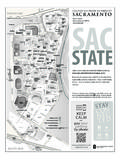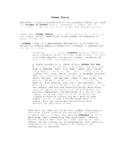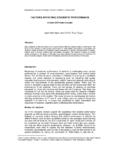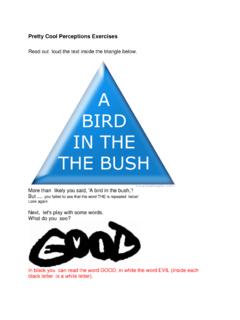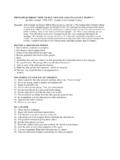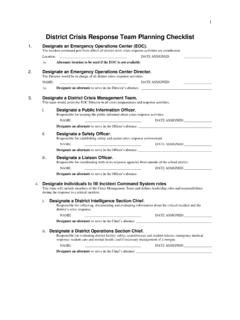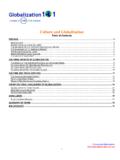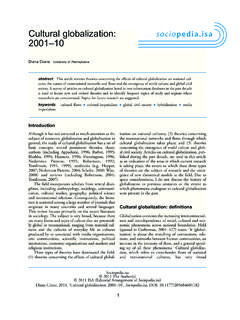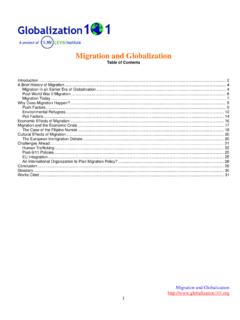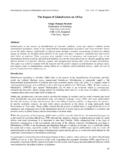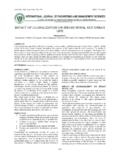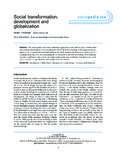Transcription of Topic: The Impact of Globalization on African Culture
1 Topic: The Impact of Globalization on African Culture . by Yeboah Kwame University of Southern Denmark, Odense: Brief Abstract: Globalization has generated a lot of controversy with regard to the rise of a global Culture . Western norms and practices are gradually being transported across the globe as the acceptable way of behaviour. In view of this, the rich and dynamic African Culture has been diluted. This paper is therefore designed to outline and critically assess the influence of Globalization on African Culture . Since its conception and birth, Africa has been a cultural cornucopia-a rich harvest of indigenous traditions and Culture that have attracted several people around the world to witness the manifestation and largess of such practices.
2 It must be said that the observance of tradition and Culture and exploitation of their artefacts, many of which come in the form of statements, beliefs, legends, and customs from generation to generation have been the very definition of the African . Introduction Many scholars, opinion leaders and political analysts etc. have expressed divergent and dissenting views regarding the effects of Globalization on individuals, nations and the world at large. I have decided to focus my search on Africa to identify how Globalization has impacted on Africans and perhaps pin-point the necessary actions that need to be taken to ensure maximum benefits for Africa in this era of Globalization .
3 It is worth noting that, the Impact of Globalization on Africa has been diverse. A look at the various interpretations of the term Globalization reveals interaction and subsequent integration of the peoples and nations into a common system. If the central idea of Globalization is interaction and integration, then Globalization as a concept is not new to Africa and the world in general. Africa s interaction with the rest of the world dates back to the 15th century. The initial contact was through trade including the trans-Atlantic slave trade, and then during the period of colonialism whereby Europeans assumed political and economic control over most parts of Africa and through the era of post colonialism or independence to this present age.
4 If we agree that any form of interaction result in a certain level of influence and hence consequences either good or bad, then it can be said that Africa s interactions and integration into the global system at any given period has played a role in what Africa is today. The consequences are both negative and positive. On a balance of probability, there is the temptation to conclude that the consequences of Globalization on Africa have rather been negative. What is Globalization ? In defining and explaining Globalization , Nsibambi (2001), incorporated five concepts.
5 He defined Globalization as a process of advancement and increase in interaction among the worlds Countries and peoples facilitated by progressive technological changes in locomotion, Communication, political and military power, knowledge and skills, as well as interfacing of cultural values, systems and practices . He noted that Globalization is not a value-free, innocent, self-determining process. It is an international socio-politico-economic and cultural permeation process facilitated by policies of governments, private corporations, international agencies and Civil society organizations.
6 It essentially seeks to enhance and deploy economic, political, technological, ideological and military power and influence for competitive domination in the world. In this report, Globalization is defined as a process of linking the regions and/or nations of the world which is facilitated by information flow (communication) inducing changes in the pre-existing socio- cultural , political, economic etc., structure and systems of nations and peoples . The adoption of this definition is in line with the aim of this report to examine the Impact of Globalization on Africa s Culture .
7 Globalization and Africa Globalization as a concept is not new to the world. Scholars believe there has been three major phases of Globalization : 1870-1914. 1945-1980 and from 1980 till now (Ajayi, 2003). This however, depends on how one defines and explains Globalization . With regard to Africa, international contacts and exchanges are not new. Africa s history is marked by foreign European involvement. Africa had been in contact with other parts of the world and also had significant interactions within it. Interaction with the outside world particularly Europe and America started way back in the 15th century.
8 This has significantly altered the course of Africa history-culturally, politically, economically etc. Africa s contact with the rest of the world started through trade, including the trans-Atlantic slave trade. This was the period when western merchants bought from African slave traders Africa s most valuable resources (able-bodied men, women and children). The second was the era of colonialism, when Europeans at a conference in Berlin in 1884 divided up Africa among themselves and instituted direct control and rule over African countries. This division was done without regard to ethnic, cultural , linguistic and other considerations.
9 The next stage of Africa interaction with the world particularly Europe was during the era of independence from colonial rule. The features of pre- colonial and post- colonial era will be discussed at other section of the report. Beginning the last decade of the 20th century into the 21st century, Africa s linkage with other parts of the world has entered a new phase commonly termed as Globalization . Though the term Globalization may be new, the substance and ideals are not new to Africa and the world as a whole. Africa, a brief introduction Africa is one of five of the world s continent.
10 It is the second largest continent in the world both in area and population. It has an area of 11,699 square miles, more than three times the size of USA. In 1990, Africa had a population of 642 million representing 12% of the world s population. Africa is made up of over fifty nations with an estimated one thousand different languages spoken and as many distinct ethnic group. Africa is perhaps the most linguistically and ethnically diverse of the entire world s continent. Africa is endowed with immense natural and human resources, as well as great cultural , ecological and economic diversity.
